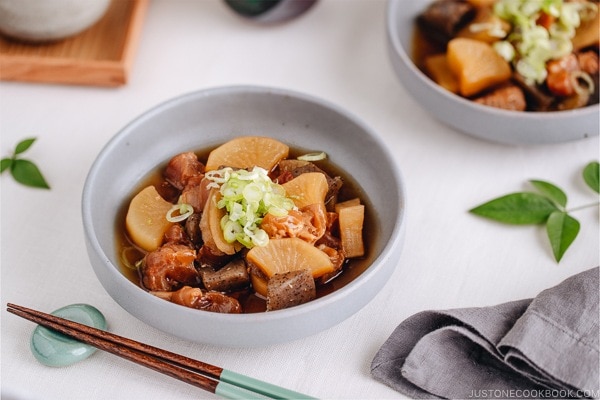Japanese Beef Tendon Stew
4.9
(10)
Your folders
Your folders
Prep Time: 30 minutes
Cook Time: 145 minutes
Total: 175 minutes
Servings: 4
Author : Namiko Chen

Ingredients
Export 10 ingredients for grocery delivery
Instructions
Step 1
Gather all the ingredients.
Step 2
Add the rinsed beef tendon and 4 cups water (Add more to cover the tendon, if necessary) in the Instant Pot.
Step 3
Press the “Sauté” button and change to your setting to “More” by pressing the “Adjust” button.
Step 4
Once boiling, press the “Keep Warm/Cancel” button on the Instant Pot to stop cooking. Take out the inner pot and discard the water.
Step 5
Put the inner pot with the tendons back in the Instant Pot and add 4 cups water.
Step 6
Peel the ginger skin with the back of the knife or spoon and cut into thin slices. Cut the green onions in half, reserving the white bottom part.
Step 7
In the Instant Pot, add the sliced ginger and green part of the green onions.
Step 8
Cover and lock the lid. Press the “Manual” button on the Instant Pot. Set HIGH pressure for 30 minutes by pressing “+ (plus)” or “- (minus)” button to change the cooking time. Make sure the steam release handle points at “Sealing” and not “Venting”. The float valve goes up when pressurized. [For stovetop cooking, bring the water to boil and lower the heat to simmer and cook for 3 hours.]
Step 9
Using a spoon to cut the konnyaku into bite-size pieces.
Step 10
Sprinkle ½ tsp kosher salt over konnyaku and rub with your hands. Salt helps konnyaku release some unwanted smell and then absorb flavors later on.
Step 11
Bring water to boil and cook the konnyaku for 5 minutes.
Step 12
Peel and cut daikon into ½ inch quarters.
Step 13
Using the back of the knife, remove the thin layer of gobo skin (do not peel: flavors of gobo is right under the skin). Then diagonally cut gobo into ⅛ inch (3 mm) slices. Soak in water to prevent it from changing colors.
Step 14
When it’s finished cooking, the Instant Pot will switch automatically to the “Keep Warm” mode. Let the pressure release naturally, about 15-20 minutes. Open the lid and take out the inner pot.
Step 15
Drain the cooking liquid and rinse under warm water.
Step 16
Rinse every part of the tendons with warm water. Drain well and cut the tendons into small pieces. Put them in a bowl and set aside.
Step 17
Quickly rinse and dry the inner pot and place it back in the Instant Pot. Add 2 cups dashi, 3 Tbsp sugar, and 3 Tbsp sake in the pot.
Step 18
Add 4 Tbsp soy sauce and 2 Tbsp miso, and mix well together.
Step 19
Put the cleaned beef tendons and mix together with the sauce.
Step 20
Cover and lock the lid. Press the “Manual” button on the Instant Pot. Set HIGH pressure for 10 minutes by pressing “- (minus)” button to change the cooking time. Make sure the steam release handle points at “Sealing” and not “Venting”. The float valve goes up when pressurized. [For stovetop cooking, bring the sauce to boil and lower the heat to simmer and cook for 1 hour.]
Step 21
When it’s finished cooking, the Instant Pot will switch automatically to the “Keep Warm” mode. Let the pressure release naturally for 15-20 minutes or proceed with the quick release by turning the steam release handle to the “venting” position to let steam out until the float valve drops down. Hold a kitchen towel and do not place your hand or face over steam release valve.
Step 22
Add the konnyaku, daikon, and gobo.
Step 23
Cover and lock the lid. Press the “Manual” button on the Instant Pot. Set HIGH pressure for 10 minutes. Make sure the steam release handle points at “Sealing” and not “Venting”. The float valve goes up when pressurized. [For stovetop cooking, bring the sauce to boil and lower the heat to simmer, and cook for 1 hour.]
Step 24
When it’s finished cooking, the Instant Pot will switch automatically to the “Keep Warm” mode. Let the pressure release naturally for 15-20 minutes.
Step 25
Chop reserved half green onions into thin rounds. Serve the beef tendon stews in a bowl and garnish with green onion. Serve warm.
Step 26
You can store the leftovers in an airtight container and store in the refrigerator for up to 3 days. I don't recommend freezing as konnyaku will change the texture.